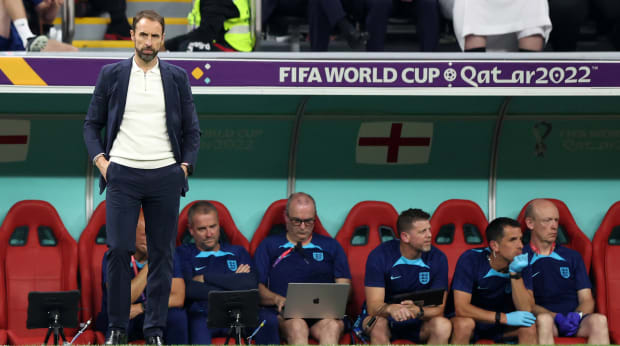The Three Lions were outplayed by the Americans for much of Friday’s goalless match after seemingly turning a corner of incisiveness in their opener vs. Iran.
AL KHOR, Qatar — For England, this all felt a bit more familiar. A grim goalless draw, boos at the end and a performance lacking in ambition and creative spark. This is what tournament games are supposed to feel like, and the result is that Al Khor joins Rustenburg, South Africa, and Belo Horizonte, Brazil, on the list of venues in which England has failed to beat the USA at World Cups.
To an extent it doesn’t matter. England still tops the group and would have to lose by four against Wales to fail to advance to the knockout stage. Given how results have gone in other groups, finishing second may even offer the better route through the tournament, avoiding France in the quarterfinal, but this was a performance so blunt that it feels any discussion of how England may make its way through the World Cup is academic. Play like this and it will go out sooner rather than later anyway.
The question after the 6–2 win over Iran was whether England had somehow found a brisk incisiveness, whether its players had been able maintain club form, perhaps because of the lack of break between the domestic season and the start of the World Cup, or whether Iran had just defended terribly. Here was the answer: against a U.S. team that defended deep and with discipline, that stifled midfielder Jude Bellingham and counterattacked with intelligence, England struggled to create chances and was outplayed for long periods.

PIOTR KUCZA/FOTOPYK/IMAGO
After the ease of the win over Iran, this was a dose of reality for England. The slick interchanges of Monday were gone, distribution from the back was slow and possession was frequently lost. Even set piece delivery began to go awry—a sure sign of England playing poorly. After a bright start that culminated with U.S. center back Walker Zimmerman blocking a Harry Kane shot after Bellingham had released winger Bukayo Saka, England lost any sense of rhythm. If that was the result of complacency, getting away with a dull draw—a record 12th 0–0 for England at World Cups.
“We lacked a little bit of zip and quality in the final third,” said England manager Gareth Southgate. “I was pleased with our application, our resilience without the ball, our recovery runs, and our defending of our box. To be a successful team in a tournament you’ve got to show these difficult faces. The two center backs were outstanding with the ball against the U.S. press.”
Creditor: USMNT Stares Down England in Hard-Fought World Cup Draw
But what is perhaps most alarming is how poor England was without the ball, the way the US was able to work dangerous positions 30-40 yards from goal. A lack of inspiration against a team defending deep is understandable. The danger in which England placed itself is not. That’s why comparisons with the Scotland game at last summer’s Euros don’t feel entirely apt; England was the better side in that 0–0. Here it was not.
Southgate’s model is Portugal at Euro 2016 and France at the 2018 World cup, sides that essentially set up not to lose, that kept it tight and won the details. It’s an approach that has taken England to the World Cup semifinal and the final of Euro 2020, but in both there was a sense that he lost the details, that he failed to react quickly enough as the game turned against his side. Here, at least, by bringing on Jordan Henderson, he tempered Weston McKennie’s domination of midfield, while the arrival of forwards Jack Grealish and Marcus Rashford gave England additional thrust down the flanks. England might even have won it with Harry Kane’s late header, but that would have been fortunate.
The nature of the performance against Iran perhaps convinced some that Southgate had changed, but his blueprint has always been conservative. There will be those who ask why Man City’s Phil Foden wasn’t introduced from the bench, but the bigger issue was to regain control of midfield and make sure a disappointing draw didn’t become a desperate defeat.
“This is the tournament of external noise,” Southgate said, and it has been one of his great strengths that he has rarely yielded to that. After the dreadful four Nations League games in June, he admitted he had been lured into compromising his principles, the implication being he would not make that mistake again. And that may mean more grinding performances. The key is then the details and, for once, Southgate did shift those back England’s way with his late substitutions. The issue is why the game was going against England in the first place.
More Soccer Coverage: